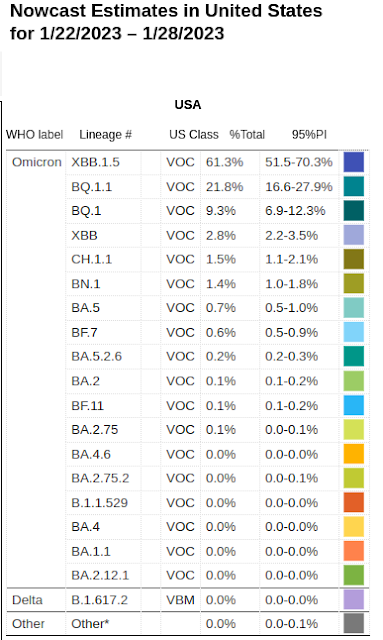
#17,258
Both XBB.1.5 and CH.1.1 were the subject of a preprint we looked at on Monday (see Preprint: Extraordinary Evasion of Neutralizing Antibody Response by Omicron XBB.1.5, CH.1.1 and CA.3.1 Variants), that reported `a nearly complete escape of these variants from neutralizing antibodies stimulated by three doses of mRNA vaccine', but suggest that neutralization can be improved (2~8-fold higher nAb titers) by receipt of the bivalent booster.
They cautioned, however, that both the CH.1.1 and CA.3.1 variants were `highly resistant to both monovalent and bivalent mRNA vaccinations. In the UK, CH.1.1 currently leads over XBB.1.5, but it it is far from clear whether it can compete with XBB.1.5 in the United States.
As always, CDC Nowcast numbers are estimates, based on incomplete reporting, and are most useful for spotting trends. The CDC has added the following caveat to this week's report.
Projections for an emerging lineage with a high growth rate may have a higher degree of uncertainty (wider predictive interval) when it is just beginning to spread and still has low weighted estimates. Projections may also be biased during times of delayed reporting (e.g., around holidays). CDC performs frequent evaluations of Nowcast to inform performance improvements.
So far, CH.1.1 appears to be making only limited gains in the United States - primarily in the Midwest and Western half of the country - but it bears watching.
While XBB.1.5 currently leads the pack, how it will reign is unknown. Omicron is highly mutable, and another more transmissible or immune evasive variant could emerge at any time.
The good news is, we've seen several reports suggesting that the new bivalent COVID booster provides additional protection compared to the older vaccine, and we know that face masks can reduce transmission of the virus.
But to work, we have to embrace their use. And far too few appear to be doing so.


